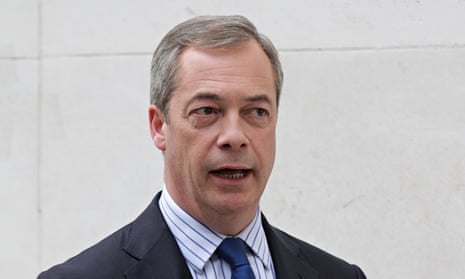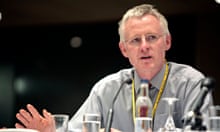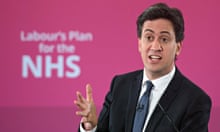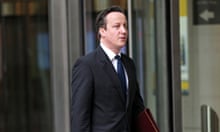Tensions over Ukip policy broke into the open on Tuesday night as Nigel Farage’s views on NHS funding reform were openly rejected by the party’s health spokesman.
Louise Bours, the official in charge of health policy, said Farage was “entitled to his opinion” but Ukip members would reject their party leader’s idea of funding the NHS through an insurance-based system run by private companies if the leader tried to raise it for debate again.
This dispute originally emerged after Farage was filmed suggesting in 2012 that he would have more confidence if the NHS was funded “through the marketplace of an insurance company”.
Speaking to the BBC’s political editor, Nick Robinson, this week, Farage acknowledged that he backed down from his position after a backlash in Ukip. He told Robinson for his Radio 4 series Can Democracy Work?: “I triggered a debate within Ukip that was outright rejected by my colleagues, so I have to accept that. As time goes on, this is a debate that we’re all going to have to return to.”
After those comments were broadcast, Bours stressed Ukip’s current policy of keeping the NHS free at the point of use for all.
Bours said: “Nigel is entitled to his opinion and others are entitled to theirs. We don’t whip people into all thinking the same thing, like the establishment parties. As he has said before, he raised the idea for discussion a while ago, the party discussed it and rejected it.
“I am certain that if the party discuss it again, we will reject it again. The vast majority of Ukip members, the British public and I will always favour a state-funded NHS.”
Ukip downplayed the disagreement, saying it was a sign of the party’s democratic nature. However, it coincided with further tensions over policy that mean Tim Aker, the official in charge of writing Ukip’s manifesto, has been replaced with just four months to go before the general election.
The party insisted that 29-year-old Aker had stepped down as policy chief to concentrate on his campaigning for parliament and work as an MEP but the decision to replace him with deputy chairman Suzanne Evans raised eyebrows just weeks before the manifesto was due to be unveiled.
The manifesto is intended to be a fully costed, mature, policy document to show Ukip has grown up as a party since its 2010 manifesto – which included pledges to make the circle line on London’s underground circular again and to enforce a proper dress code at the theatre.
But although the document is widely expected to be unveiled at the party’s spring conference in Margate at the end of February, one Ukip insider told the Guardian some key policies will not actually be released until after the budget in late March. Another official told the FT that the key document was currently just “a series of bullet points”.
Other internal Ukip conflicts are understood to revolve around the opinions of new Ukip MP Douglas Carswell, who has been clear that he believes the NHS budget should go up and that his party should show an inclusive, internationalist attitude that stresses immigrants are not to blame for society’s woes.
As part of the battle between modernisers and traditionalists, there is also a struggle between those would prefer a sharper range of policies to appeal to former Labour voters against those who want it to stick to its core values.
However, the conflicting views of senior Ukip figures on some key policy areas are also working to the party’s advantage. For example, this may allow activists to argue in Labour-facing seats that it is committed to protecting the NHS and in Conservative-facing ones that Farage has raised the idea of reforming health service funding.
Farage will also be aware that projecting an image of a party that allows dissent is potentially attractive at a time when politicians are criticised for sounding too similar. He has also long sought to undermine the idea that Ukip is a one-man band that centres around his leadership.
In an interview with Buzzfeed, Carswell played down the idea that he was personally influential in the party or would succeed Farage.
I’m not one of Ukip’s major players,” he said. “I will never hold ministerial office, that’s just my personal choice. I’m not playing that game, I’m not playing that level. Ukip has some absolutely first-class people in it who I think will go all the way but my job is to help support that, help with the key seats campaign, help in supportive role with policy.”








Comments (…)
Sign in or create your Guardian account to join the discussion